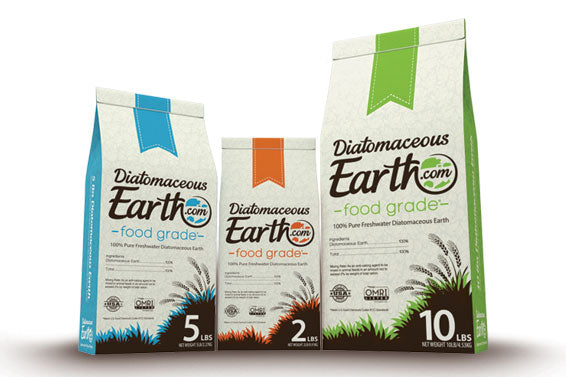
One thing that sets our diatomaceous earth apart from our competitors is our colorful paper packaging. As far as we can tell, we are the only diatomaceous earth company that sells DE in paper bags. Why is this significant? We believe paper is better for you and the environment.
Better for You
Paper is better for your health because it helps you avoid BPA and other potentially harmful chemicals that plastic commonly contains. And with DE being as porous and abrasive as it is, you wouldn't want it to scrape plastic particles into the DE you are ingesting, would you? While we don't think that plastic is poison or anything, we do think that the more you can replace it with paper, the better.
Better for the Environment
There's a lot of controversy about whether the paper or plastic industry is better for the environment. The fact of the matter is they are both kinds of bad. Paper production causes more greenhouse gases than plastic, while plastic is a concerning source of litter, damage to wildlife, and piling in landfills. It's tough to know which is better, but we side with paper, and here are a few reasons why:
- Paper comes from trees, which are a renewable resource, far more renewable than oil, which is where the plastic comes from. This doesn't mean we are OK with deforestation. When trees are cut down, we believe more trees should be planted to take their place.
- Paper is biodegradable, but most plastics are not. Paper will decompose in a few weeks, maybe a month or two. Plastics have to be broken down by sunlight, which can take decades or even centuries (About.com).
- Paper is often more recyclable than plastic. When oil prices dropped last winter, it became harder for recycling companies to compete with new plastic. Cheap oil led to new plastic that was cheaper than recycled plastic. Because of this, a lot of plastic that could have been recycled was abandoned in landfills. Paper wasn't affected by this. And even when it isn't recycled, it decomposes down to nothing far quicker than plastic (NPR.org).
Our Other Types of Packaging
While our most popular products are packaged in paper bags, we do have some that aren't. Our 1 lb bag, for example, may look like it's plastic, but it's actually a type of rice paper that breaks down much faster than plastic.
Our 1 liter and 2-liter shaker bottles are the only plastic containers we sell food grade DE in. If you buy one of our shaker bottles, we highly recommend hanging onto it and refilling it from one of our paper bags. And if you do need to dispose of it, please recycle.
Reducing Our Carbon Footprint
Our packaging isn't the only way we're going green. We also work to diminish our carbon footprint. Every day, we ship products nationwide, which contributes to air pollution. To combat this, we use UPS's "carbon neutral shipping option." This means that UPS makes up for the damage that shipping our DE does to the environment by supporting "projects that include reforestation, landfill gas destruction, wastewater treatment, and methane destruction" (UPS.com).
Moving Forward
Our company has grown a lot over the past few years, and we look forward to responsibly providing diatomaceous earth for many years to come. And as we grow, we continue to seek better ways of providing our products, ways that are better for you and better for the environment. We invite you to join us by recycling your paper and plastic waste and by finding ways to conserve energy.


